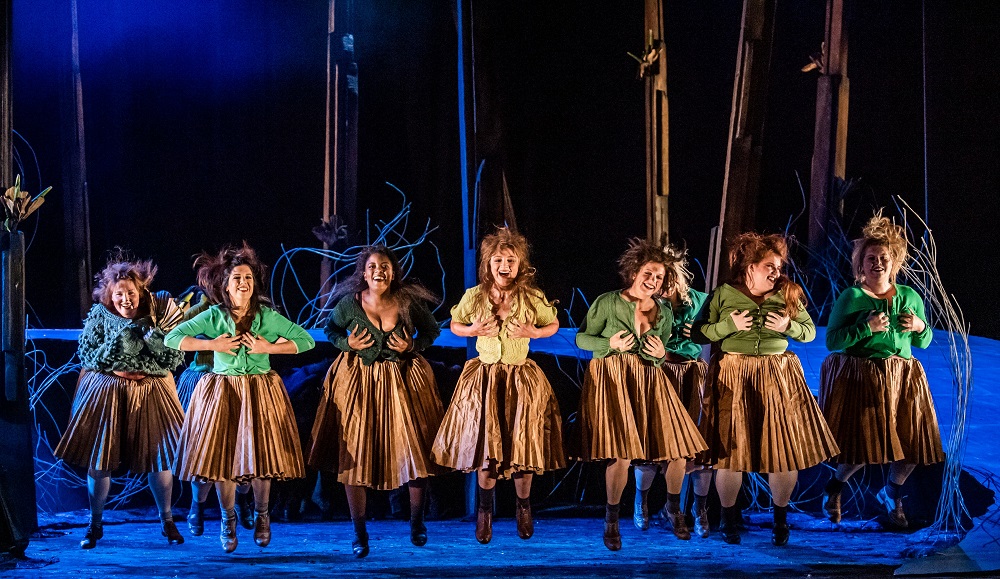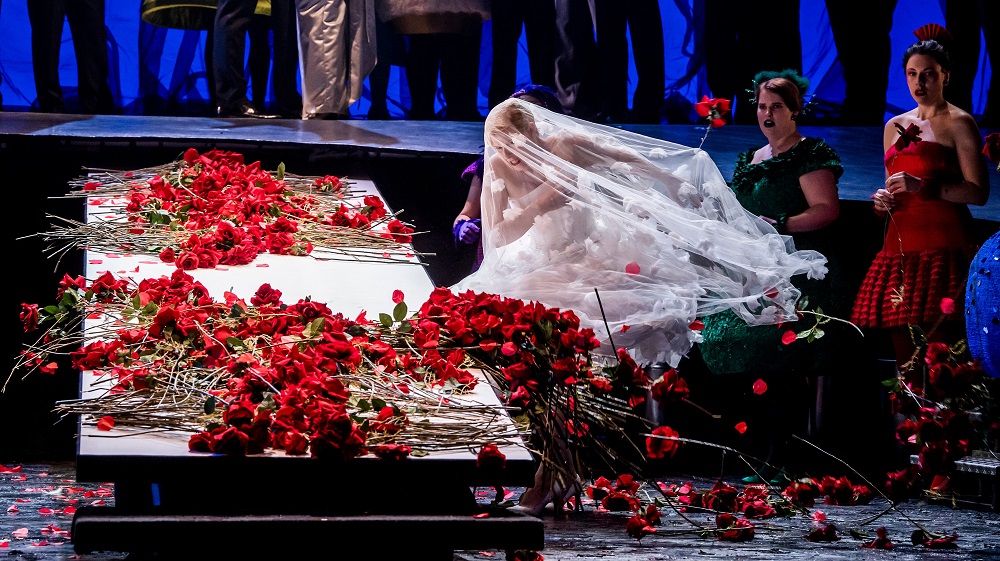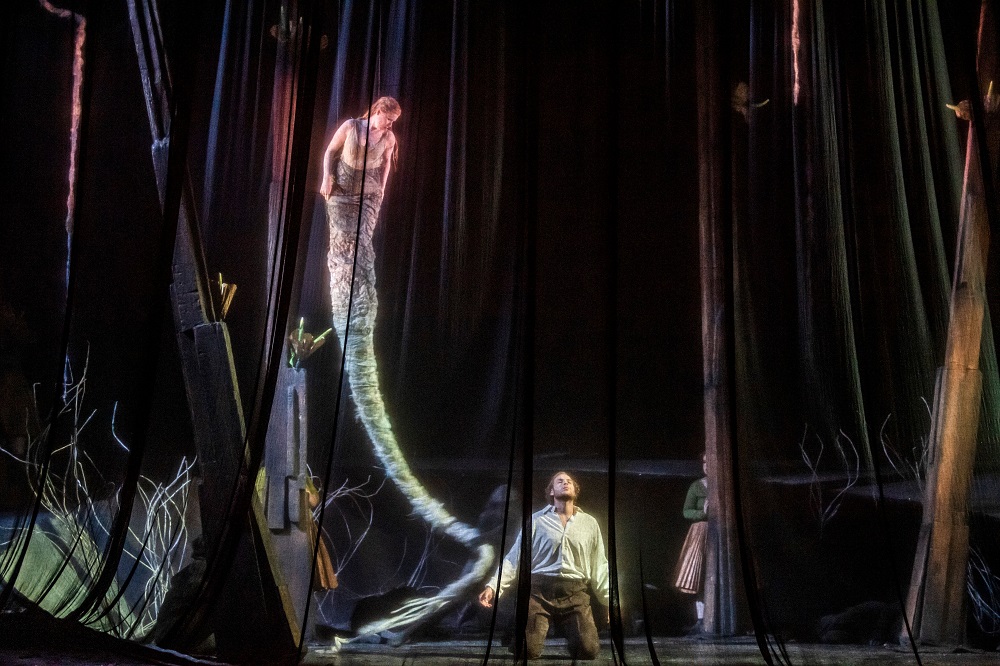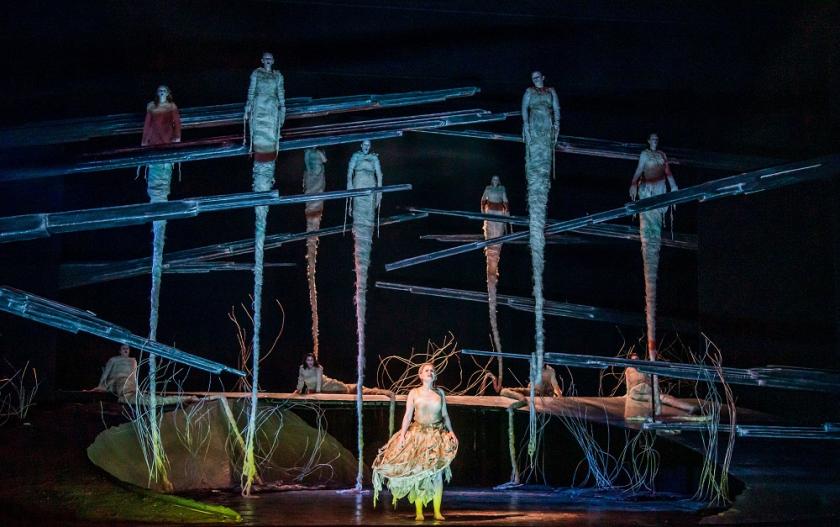When you think of the extravagant, violent, super grown-up subject-matter that stalked the operatic stage round about 1900 - the Toscas and the Salomes, the Cavs, the Pags and the rest of the verismo pack - you might find it strange to contemplate the ageing Dvořák still messing around with fairies at the bottom of his woodland pool, a subject that surely went out with the early Romantics.
But you’d be wrong. His Rusalka is just as much a creature of the distressed mind as the heroine of Schoenberg’s Erwartung or, for that matter, Debussy’s Mélisande, who could well also be a stranded water nymph (we never find out). And this revival of Melly Still’s now ten year-old production rightly has no truck with the fay conventions of the romantic dream world, but, without denying the imagery, brings out the extreme menace, the coarseness and sometimes sheer nastiness that lurk just below the surface of what we’re pleased to call civilised life.
Dvořák had spent his twenties playing principal viola in the orchestra of the Provisional Theatre in Prague. He had played under Smetana and, on one notable occasion in 1863, Wagner. And he clearly, audibly, kept in touch with opera thereafter. Rusalka is an eclectic work, indebted to Wagner in harmony and symphonic technique, but with echoes, too, of Tchaikovsky, Bizet, even Verdi. Yet withal it remains an intensely Czech-feeling work: Czech folklore, folk music, even folk instrumentation, ring through this superbly crafted score. And the music has a range of character and an emotional sweep rare in Czech opera before Janáček.  Still’s production is similarly devoid of the airy-fairy. Her first act wood nymphs (pictured above) are about as sensuous as drunken karaoke singers at a Butlins Saturday night and a good deal more frightening, while Rusalka’s fellow water nymphs, dangling their twelve-foot mermaid’s tails from the flies, are beautiful, spine-chilling figments of a six year-old’s nightmares. No wonder Rusalka wants to escape into what she thinks of as the real world.
Still’s production is similarly devoid of the airy-fairy. Her first act wood nymphs (pictured above) are about as sensuous as drunken karaoke singers at a Butlins Saturday night and a good deal more frightening, while Rusalka’s fellow water nymphs, dangling their twelve-foot mermaid’s tails from the flies, are beautiful, spine-chilling figments of a six year-old’s nightmares. No wonder Rusalka wants to escape into what she thinks of as the real world.
Alas she can only do so without speech, her mouth closed - the witch Ježibaba warns her - to every human ear. The world of her Prince Charming and his (her) wedding guests is as uncontactable as in those dreams where one tries but can’t shout for help (Act Two pictured below). Melly Still lapses here into a certain crudity as Rusalka drops her knickers as the only way of distracting the Prince from her exotic rival, the Foreign Princess (Dvořák’s characters are all types without names). But she rises brilliantly to the great emotional climax of the final act, a Liebestod of quasi-Wagnerian power if purely Dvořákian colouring, but with many more characters to manoeuvre and a richly complex dramaturgy that if anything looks forward to Janáček’s Vixen as much as backward to Tristan.  The power of this ending is astonishing in the way it is both achieved and sustained, by a composer with no great reputation as a writer for the theatre. But it naturally depends on exceptional singers, and it finds them here. Sally Matthews grows in stature from a lovely performance of her Silver Moon aria, through the tormenting silences of her wedding feast, to the lyrical outpourings of the closing pages. She has evolved into an outstanding dramatic soprano, with a strong chest voice, masterly control and linkage throughout the range, and a compelling stage presence, not always ideally helped by Rae Smith’s (perhaps deliberately) unflattering costumes.
The power of this ending is astonishing in the way it is both achieved and sustained, by a composer with no great reputation as a writer for the theatre. But it naturally depends on exceptional singers, and it finds them here. Sally Matthews grows in stature from a lovely performance of her Silver Moon aria, through the tormenting silences of her wedding feast, to the lyrical outpourings of the closing pages. She has evolved into an outstanding dramatic soprano, with a strong chest voice, masterly control and linkage throughout the range, and a compelling stage presence, not always ideally helped by Rae Smith’s (perhaps deliberately) unflattering costumes.
Her Prince, the American tenor Evan LeRoy Johnson (pictured below with Matthews), is hardly less impressive: aptly a full foot taller than his poor fairy bride, but matching her in lyric quality and, I suspect (not knowing the language) in feeling for the Czech idiom. Their final duet, ending with her kiss of death, is a wonderfully delicate, intimate climax to these elaborate, haunting goings-on.  There is much else to praise. Alexander Roslavets makes of the Vodnik (Water Spirit) a figure both fearsome and, in an Alberich sort of way, grandly sympathetic. Colin Judson and Alex Le Saux are a witty foil, as the Gamekeeper and Scullery Maid who later tangle, Bottom-like, with the fairy element; Patricia Bardon makes something perhaps a shade too likeable of Ježibaba, a nicer witch, it’s true, than the one in Hansel and Gretel, which isn’t saying much. Zoya Tsererina does the most possible with the Foreign Princess, here directed as a sort of smart PA, if not quite such as to cause flutters of jealousy among the nymphs of the typing pool. The character is a failure of Dvořák’s, not Still’s; but she could perhaps be sexed up a touch more by the director.
There is much else to praise. Alexander Roslavets makes of the Vodnik (Water Spirit) a figure both fearsome and, in an Alberich sort of way, grandly sympathetic. Colin Judson and Alex Le Saux are a witty foil, as the Gamekeeper and Scullery Maid who later tangle, Bottom-like, with the fairy element; Patricia Bardon makes something perhaps a shade too likeable of Ježibaba, a nicer witch, it’s true, than the one in Hansel and Gretel, which isn’t saying much. Zoya Tsererina does the most possible with the Foreign Princess, here directed as a sort of smart PA, if not quite such as to cause flutters of jealousy among the nymphs of the typing pool. The character is a failure of Dvořák’s, not Still’s; but she could perhaps be sexed up a touch more by the director.
Admirably upfront chorus nymphs (literally so as they shake their breasts in the refrains of their opening chorus), some clever dance acrobatics, and above all hugely eloquent, stylish orchestral playing by the LPO under Robin Ticciati, whom I last heard conducting Glyndebourne’s Pelléas at the Proms. His feeling for the shape and flow of this music of the early 1900s gets more and more complete, not least because these works may inhabit the same world but speak different languages: the Rusalka problem precisely, here, at least, solved.














Add comment